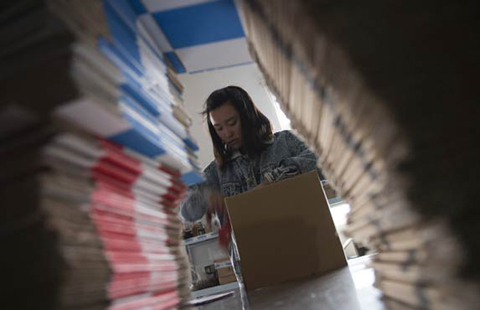PBOC cuts rates to ease business financing
Updated: 2015-02-28 20:26
By Jiang Xueqing(chinadaily.com.cn)
|
||||||||
Related story:
Further monetary easing will be 'a trend' by Chen Jia, China Daily
China is heading into a monetary easing cycle this year, and further policy adjustments will be seen in coming months, a government think tank leader said on Friday.
 |
|
Li Yang, vice-president of the Chinese Academy of Social Sciences.[Photo/China Daily] |
Li Yang, vice-president of the Chinese Academy of Social Sciences.[Photo/China Daily]
"The government's bottom line for economic growth in 2015 should be 7 percent, and it could be lower next year, as the leadership has shown greater tolerance over the pace," Li said.
Further monetary easing is certain to be seen "at the right time" in coming months and will be a trend in the next two to three years. It is not designed to stimulate growth aggressively, but to transform the economy steadily into a "new normal" era of development.
"A moderate easing of monetary policy could avoid a sharp rise in unemployment or social instability and is necessary at this point," Li said.
He said GDP growth in the first quarter may continue to slip from the 7.3 percent recorded in the fourth quarter of last year. The Chinese economy grew at a 24-year low of 7.4 percent last year.
According to the academy, GDP growth this year may slow to 7 percent, with consumer price inflation of 1.3 percent.
The academy's Economics Department met on Friday in Beijing to discuss the economic situation and give suggestions to policymakers ahead of the annual sessions of the National People's Congress and National Committee of the Chinese People's Political Consultative Conference, which start on Tuesday.
Premier Li Keqiang will deliver the Government Work Report for 2015 on Thursday. The report is expected to give an assessment of China's economic performance last year and set economic targets and policy objectives for this year.
Zhang Ping, deputy head of the Institute of Economic Research at the academy, said that in view of deflation, especially in the manufacturing sector, it will be hard to maintain 7 percent growth in the second quarter of this year if economic deterioration continues, and without any large stimulus measures in the first quarter.
In January, the Producer Price Index, which indicates industrial inflation, dropped to its lowest level since the global financial crisis, declining by 4.3 percent from a year earlier, compared with a 3.3 percent fall in December.
The PPI reading has remained negative for more than three years.
Zhang said that under pressure from deflation, companies' profits have been dropping, increasing commercial banks' nonperforming loans and adding risks to the financial system.
"China needs to cut benchmark interest rates further and launch a special asset purchasing plan, learning from the International Monetary Fund's reform and asset replacement measures," he said.
To support growth, China's central bank lowered the reserve requirement ratio, the minimum level of reserves banks must hold, by 50 basis points from Feb 5, the first universal cut since May 2012.
This followed an unexpected move to cut interest rates in November, the first reduction in more than two years.
Li Xuesong, deputy head of the academy's Quantitative and Technical Economics Institute, said further easing of monetary policy may accelerate capital flows out of China and increase depreciation pressure on the yuan against the US dollar.
According to his research, capital outflows reached 319.4 billion last year.
On Friday, the National Bureau of Statistics released a report forecasting that the United States may raise benchmark interest rates after June, which could trigger abnormal cross-border capital flows.
"Fluctuations in the foreign exchange market will impact on domestic economic stability, and appreciation of the US dollar will increase China's foreign debt burden," the report said.

 Best times to view spring flowers in Beijing
Best times to view spring flowers in Beijing
 Dragon boat race to celebrate Chinese New Year in Sydney
Dragon boat race to celebrate Chinese New Year in Sydney
 South Pole setting for wedding photos, penguins included
South Pole setting for wedding photos, penguins included
 Milan Fashion Week - Autumn/Winter 2015-16
Milan Fashion Week - Autumn/Winter 2015-16
 Russian opposition leader Nemtsov shot dead in Moscow
Russian opposition leader Nemtsov shot dead in Moscow
 Across America over the week (from Feb 20 to 26)
Across America over the week (from Feb 20 to 26)
 Phoenix landing
Phoenix landing
 Inside a Taobao village
Inside a Taobao village
Most Viewed
Editor's Picks

|

|

|

|

|

|
Today's Top News
PBOC cuts rates to ease business financing
China ends UN council presidency
Tech firms cut from approval list
Yuan on move, but not to top
'Star Trek' legend Leonard Nimoy dies at 83
US Representative requests Lunar New Year honors
EB-5 could harbor fraud: report
Shanghai tops China's disposable income list
US Weekly

|

|








